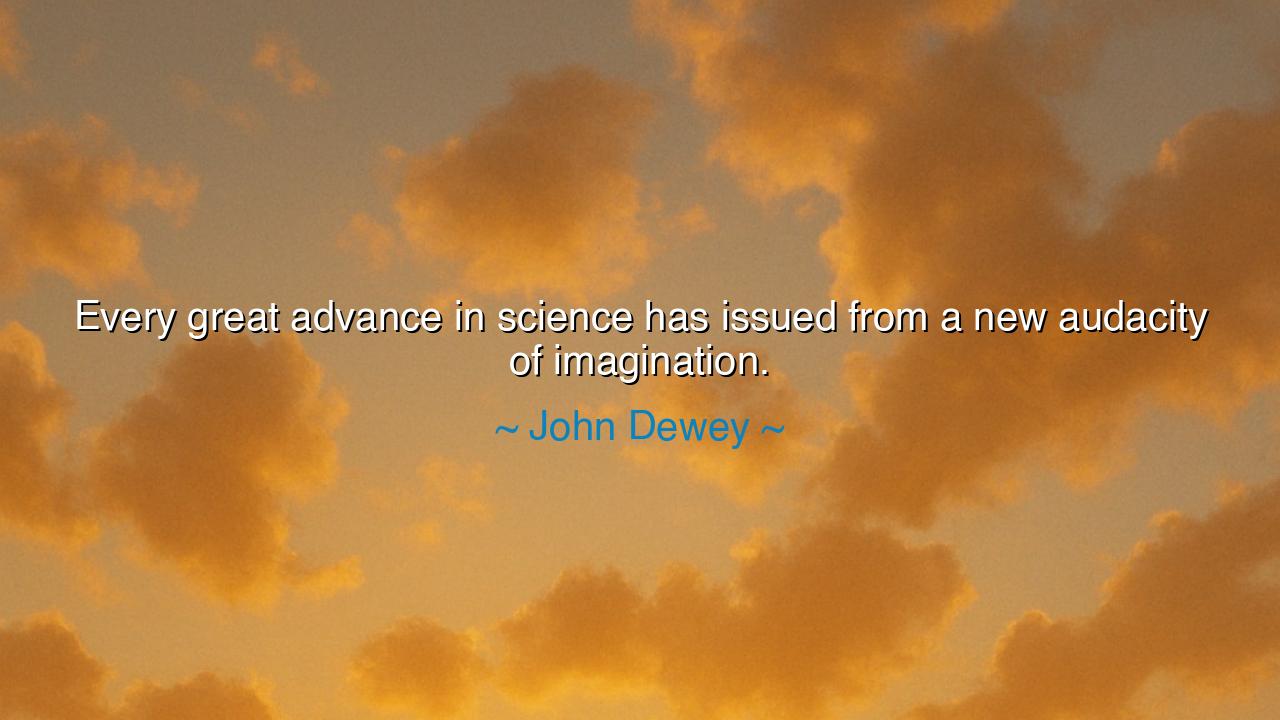
Every great advance in science has issued from a new audacity of






In the grand temple of human knowledge, where the flame of discovery has burned since the dawn of thought, the philosopher John Dewey once proclaimed: “Every great advance in science has issued from a new audacity of imagination.” These words are not mere praise of invention, but a hymn to the spirit of daring — the courage to dream beyond the known, to pierce the veil of the possible. For science, though it deals with truth and law, is born not of caution, but of imagination; and the mind that fears to dream will never uncover the hidden order of the universe. Dewey, who saw in education and inquiry the key to progress, knew that reason alone does not lead to greatness — it is imagination, joined with intellect, that births the revolutions of knowledge.
From the earliest ages, when humankind gazed upon the stars with wonder, it was imagination that first dared to question the heavens. Before the astronomer built his telescope, before the mathematician carved symbols into stone, there was the dreamer — one who dared to ask, “What lies beyond?” Thus began all science: not in laboratories, but in visions, in boldness of thought. The ancients imagined gods in the constellations, yet in that act of wonder, they laid the foundation for astronomy. The bridge between superstition and truth was not built by those who feared error, but by those who dared to imagine differently.
Consider the tale of Galileo Galilei, the man who raised his eyes to the sky and refused to see what others told him to see. When he looked through his crude telescope and found the moons of Jupiter, he did more than observe — he challenged the cosmos. Against the might of church and tradition, he declared that the Earth was not the center of all things. This was not merely science — it was audacity of imagination, the courage to believe that the world might be far greater than mankind had ever conceived. And though they silenced him, his vision outlived his punishment, for truth born of imagination can never die.
So too did Isaac Newton, sitting beneath an apple tree, transform a simple fall of fruit into a revelation of universal law. And Albert Einstein, centuries later, dared to imagine that time and space themselves could bend — that light could curve, that gravity was not a pull but a warping of existence itself. None of these discoveries arose from obedience to established thought; they came from minds that broke boundaries. Each of these souls carried within them the sacred audacity that Dewey spoke of — the fearless imagination that refuses to accept the limits of the ordinary.
But hear this also, my children of thought: imagination without discipline is like a storm without direction. Dewey did not praise fantasy for its own sake, but audacity joined to inquiry. The true seeker dreams boldly, yet grounds those dreams in labor and reason. The stars inspire him, but he builds his ladder carefully. To imagine is divine, but to prove — to transform vision into reality — is the sacred duty of all who would advance humankind. For the bridge between the dream and the discovery is built by perseverance, by method, by tireless effort.
Let none among you think that imagination belongs only to scientists. Every great advance in art, in justice, in human compassion, springs from the same daring. To envision a better world, to believe that suffering can end, that ignorance can yield to light — this too is science of the soul. Every movement toward truth begins with one who dares to see what others do not. The dreamers are the architects of the future; their audacity is the spark from which civilization renews itself again and again.
The lesson, therefore, is this: do not fear to imagine greatly. The laws of today were the heresies of yesterday. The boundaries you see are but illusions drawn by those who came before you. Whether you study the atom or the human heart, let your thoughts be vast and your courage deep. Question everything, yet love truth more than comfort. For it is better to fall in noble error than to stagnate in safe ignorance.
So, remember the words of John Dewey, and let them be your torch: “Every great advance in science has issued from a new audacity of imagination.” Be daring in thought, disciplined in pursuit, and humble before the unknown. For the universe yields its secrets not to the timid, but to those who dream with fire in their hearts and reason in their hands. Go, then — imagine, inquire, and build — for in your imagination lies the next great awakening of humankind.






AAdministratorAdministrator
Welcome, honored guests. Please leave a comment, we will respond soon